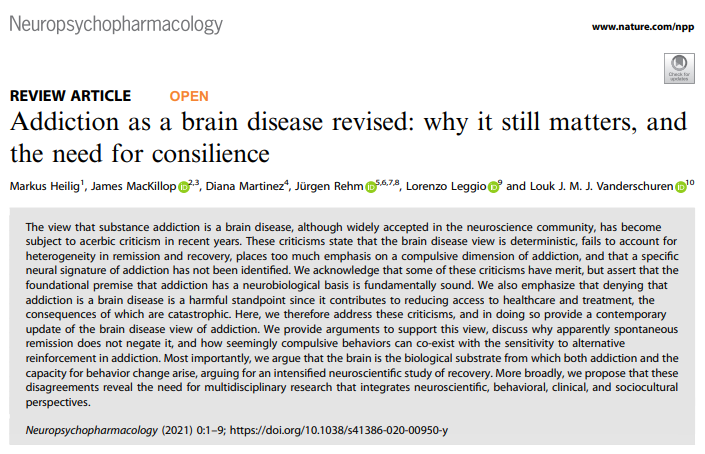
THREAD 1/
Do antipsychotics shrink the brain? No!
At long last, we have RCT data in 1st episode psychosis to disentangle effects of meds vs. disease.
nature.com/articles/s4138…
Do antipsychotics shrink the brain? No!
At long last, we have RCT data in 1st episode psychosis to disentangle effects of meds vs. disease.
nature.com/articles/s4138…
2/
Here are the striking findings.
At 3 months:
- no grey matter volume change in controls
- volume *loss* w/ placebo/psychosocial tx
- volume *increase* w/ meds
Here are the striking findings.
At 3 months:
- no grey matter volume change in controls
- volume *loss* w/ placebo/psychosocial tx
- volume *increase* w/ meds

3/
The authors found no evidence to support confounding factors and therefore concluded that antipsychotic medications "prevent or perhaps even reverse" illness-related volume loss, consistent with a possible neuroprotective effect of 2nd generation medications.
The authors found no evidence to support confounding factors and therefore concluded that antipsychotic medications "prevent or perhaps even reverse" illness-related volume loss, consistent with a possible neuroprotective effect of 2nd generation medications.

4/
This is a crucially important finding that adds evidence to an important longstanding question/debate.
What's especially interesting is that in the clinical trial (Francey et al 2020), psychosocial interventions were non-inferior to meds.
academic.oup.com/schizbullopen/…
This is a crucially important finding that adds evidence to an important longstanding question/debate.
What's especially interesting is that in the clinical trial (Francey et al 2020), psychosocial interventions were non-inferior to meds.
academic.oup.com/schizbullopen/…
5/
However, in this imaging part of that same study, volumetric increase associated with APD treatment was correlated with greater clinical improvement, at least in the first 3 months.
However, in this imaging part of that same study, volumetric increase associated with APD treatment was correlated with greater clinical improvement, at least in the first 3 months.

6/
Previous studies have shown that in uncontrolled studies, *volume loss associated with antipsychotic treatment* is also associated with *improvement* in cognitive symptoms.
pubmed.ncbi.nlm.nih.gov/25588194/
Previous studies have shown that in uncontrolled studies, *volume loss associated with antipsychotic treatment* is also associated with *improvement* in cognitive symptoms.
pubmed.ncbi.nlm.nih.gov/25588194/
7/
Taken together, these findings suggest that antipsychotic medications work and do NOT cause "brain shrinkage."
In fact, they might protect against those effects during the early phase of psychotic disorder.
Taken together, these findings suggest that antipsychotic medications work and do NOT cause "brain shrinkage."
In fact, they might protect against those effects during the early phase of psychotic disorder.
8/
Several caveats are worth mentioning... Foremost, there were no significant differences in brain volume change at 12 months, suggesting that these may be short-term effects that converge with time.
Several caveats are worth mentioning... Foremost, there were no significant differences in brain volume change at 12 months, suggesting that these may be short-term effects that converge with time.

9/
Second, I made a number of relevant comments about the Francey et al (2020) trial in FEP related to diagnostic uncertainty and antipsychotic dosing. See here:
pubmed.ncbi.nlm.nih.gov/33257137/
Second, I made a number of relevant comments about the Francey et al (2020) trial in FEP related to diagnostic uncertainty and antipsychotic dosing. See here:
pubmed.ncbi.nlm.nih.gov/33257137/
10/
Finally, the findings must also be reconciled with the seemingly contradictory RCT data of Voineskos et al. (2020) who found that APDs were associated with volume reduction compared to placebo in psychotic depression.
jamanetwork.com/journals/jamap…
Finally, the findings must also be reconciled with the seemingly contradictory RCT data of Voineskos et al. (2020) who found that APDs were associated with volume reduction compared to placebo in psychotic depression.
jamanetwork.com/journals/jamap…
11/
This commentary by Weinberger is also essential reading before entering any debates about structural MRI findings and their association to antipsychotic medication.
jamanetwork.com/journals/jamap…
This commentary by Weinberger is also essential reading before entering any debates about structural MRI findings and their association to antipsychotic medication.
jamanetwork.com/journals/jamap…
12/
But bottom line = the idea that antipsychotics (especially 2nd generation) "shrink" the brain is NOT supported by controlled evidence in first-episode psychosis.
There IS good evidence that volume loss occurs and is caused by the disease process. And yes, I said "disease."
But bottom line = the idea that antipsychotics (especially 2nd generation) "shrink" the brain is NOT supported by controlled evidence in first-episode psychosis.
There IS good evidence that volume loss occurs and is caused by the disease process. And yes, I said "disease."
@sameerjauhar @awaisaftab @amybarnhorst @tylerblack32 @wendyburn @cadoganhealthc1 @evolutionarypsy @jonathanstea @dawso007 @ProfRobHoward @DebiecJacek @DrKhan_do @ViolenceWonks @vaughanbell @J_F_Hayes @PatMcGorry @paulsummergrad @AllenFrancesMD @pash22
• • •
Missing some Tweet in this thread? You can try to
force a refresh





